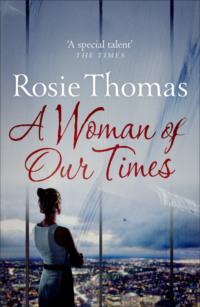
Полная версия
Daughter of the House
The water was dotted with floating debris and rescue boats that had made the short trip out from the beach. She saw some steamer passengers in the other boats, and others being helped up to the pier walkway, but she recognised none of them. The Queen Mab was almost submerged. The funnel and the wheelhouse tilted at a crazy angle, and the jaunty awning had been torn to tatters by the force of the waves.
The black flower grew so big that it filled her whole chest.
Their boat rode a wave close in to the beach and a man in big rubber waders strode out to them. He swept Nancy into his arms and carried her to the shingly rim, where she was passed along a chain of hands and finally set down on the sand where a blanket immediately enveloped her. Arthur was given the same treatment, and the boat pushed out again.
‘My father,’ Nancy screamed. ‘Where is he?’
Her legs gave way beneath her. A woman in an apron knelt to take her in her arms and wrap the blanket tighter. Nancy thought she recognised her from the cockle stall on the beach corner.
‘There you are, my love. You’m all right now. Don’t you worry.’
‘My father.’
She was shuddering now like Arthur, great uncontrollable waves of cold and panic sweeping over her. ‘My other brother. I have to find them. Phyllis was with us too. Where are they?’
‘Your daddy will be here, I’m sure. Where are you staying, my darling?’
Someone else was trying to make her drink warm milk out of a thick white cup. The smell of it was unbearable. Her teeth rattled on the rim before she managed to turn her face away. Arthur drank his although his head was hanging and he seemed too shocked to speak.
‘Terrible,’ a voice said nearby. ‘I seen one drowned at least.’
‘Not now, Mary,’ another reprimanded.
The little boats straggled back to the beach with the last of the rescued passengers. Women and children were passed ashore as Nancy and Arthur had been, to be immediately swaddled in makeshift coverings. Arthur’s friend with the cricket ball was amongst them. He was crying and trying to hide his tears. Nancy sat with her arms wrapped round her knees in an attempt to control her shivers. Her eyes stung from the salt and the effort of scanning the beach for her family.
A shadow fell across her. Mr Feather loomed tall and black like the gnomon of a sundial. One of the rescuers had draped a rough blanket over his wet clothes, giving him the look of an Old Testament prophet. The resemblance was strengthened when he raised one hand and brought it to rest on the top of her head. The uneasy sense of being weighted down that she felt in his presence now became real. She tried to duck away but his hand pinned her beneath it like one of Cornelius’s butterflies in a case. In the shingle beside her feet she saw a pink shell, the size and shape of a child’s fingernail.
In a hoarse voice he begged, ‘She slipped away from me. Where is she now? Tell me what you see. Is she here or has she passed?’
‘I can’t see anything.’ Nancy was close to sobbing. The man did know her secret, her way of seeing with her inside eyes, into places no one else saw. Ever since she was a little girl she had possessed the ability. When she was small she linked the waking dreams with her sleeping dreams, and she assumed that everyone had the two different kinds. She was almost thirteen now, and as she grew away from childhood she understood – because no else ever mentioned such a thing – that the wakeful dreams were somehow hers alone.
He crouched to bring his mouth closer to her ear. ‘Yes, you can. As soon as I set eyes on you, I knew you were a seer. Where is my Helena?’
She tried to shake off his hand, but she was paralysed. It seemed that her head was no longer made of bone and skin because it was softening and lightening to the point where it threatened to float off her shoulders. The blood noisily surged in her veins.
The beach and the rescuers melted away. Instead of the sand and a slice of busy sea she saw billows of mud with the skeletons of trees poking up like crooked fingers. At the same time a foul smell wrapped round her. She coughed in disgust and tried to pull away, but Feather still restrained her.
The smell became overpowering, nauseating. She blinked and the mud churned and there were broken men lying in it. Dozens of them were strewn as far as the eye could see, dying and already dead, with smirched or shattered faces gazing up at the white sky.
She had no idea where this horrifying place could be. All she knew was that this inside vision was made somehow sharper and more real by the man’s hand resting on the top of her head.
She screwed her eyes shut. Tears burned the inner lids. She whispered, ‘Please. Please make it stop.’
Mercifully the scene was already fading. It had been no more than a glimpse. As swiftly as it had come the smell ebbed away, carrying the mud and the wounded and dead with it. Her head grew heavy once more and wobbled on her neck, and the man’s hand lifted at last.
He murmured, ‘Don’t be frightened. You are a seer. You might even think of your ability as a gift. Some of us do.’
She didn’t want to be any sort of us, not in a company with this man who excluded her father and mother and even Neelie and Arthur.
Then to her joy she saw Devil. He was searching the knots of people lined up on the beach. She scrambled to her feet and now Feather did not try to hold her back.
‘Pappy! We’re here.’
She ran at him and pressed her face against his soaked clothes as he hugged her. Neither of them could find words. Arthur came more slowly, white with shock, and Devil bent his head over his two children.
‘Thank God,’ he murmured.
‘Mama?’ Arthur managed to ask.
‘She is safe. Cornelius is with her.’
‘And Phyllis?’
Nancy’s question was not answered. Devil thanked the cockle seller and her helpers and shepherded his children away from the rescue scene. At the pier entrance Eliza and Cornelius had been searching amongst the passengers who had been brought in that way. As soon as she saw them Eliza ran, tripping up in the constricting skirt. Tears were running down her face, her smart turban was gone and her hair had come down in thick hanks. Nancy had never seen her composed mother in such a way and the sight was deeply shocking.
Devil hustled them away from the beach. Nancy didn’t look back to see if Mr Feather was still searching for his sister. Devil said they must get back to the hotel immediately, to warmth and dry clothing. Some of the townspeople had brought drays and fish wagons down to the promenade to ferry survivors, but these had now set off and it seemed that the Wixes must either walk or take the little pleasure tram that ran to their hotel from the pier. Its driver looked incongruous in his smart braided uniform as he tried to hurry their shivering group towards it.
‘But where is Phyllis?’ Nancy demanded. Eliza was trying to massage some warmth into Arthur’s blanketed body. Cornelius took Nancy’s hand and tucked it under his arm.
‘We don’t know,’ he said.
‘Where is she?’
‘The men are looking for her,’ Devil answered.
‘We can’t go without her,’ Nancy flamed.
Her father’s face darkened. ‘There’s nothing you can do here, Nancy. Do as you are told.’
The toy tram trundled towards the hotel, leaving behind the rescue scene and the stricken steamer. It was wrong to be perched like carefree holidaymakers under the little canopy. In Nancy’s head the wind seemed to chivvy the fragments of the day, briefly pasting lurid, disjointed images of the steamer and their escape from it over the innocent seaside landscape.
Arthur had still barely spoken.
Eliza told him, ‘You’re safe now. You did very well, you know, to take care of your sister. Papa and I are proud of you.’
The tram rocked around the curve of track. Arthur turned his coin-bright profile towards Nancy. There was a tick of silence during which she prepared to accept whatever he would say. He was younger than her by fifteen months, but she was only a girl. Cornelius was watching her too from beneath his heavy eyelids. Cornelius often saw more than he would afterwards admit to.
‘I didn’t take care of her,’ Arthur said.
It must have been the salt in his throat and chest that made his treble voice crack and emerge an octave lower.
‘Nancy saved me. She was safe but she let go and came for me. The boatman told her she was a brave girl.’ There was another silence before he added, ‘So you see, actually I was rather useless.’
The last words came out in a boy’s piping voice once more.
Nancy noticed that her skirt was beginning to dry, leaving wavy tidemarks of salt. She was thinking that from today – or from the day before yesterday, really – everything would be different. You could never un-see what you had seen; that much was clear without any intervention from the Uncanny or Mr Feather.
‘No, Arthur, you weren’t useless at all,’ she mumbled.
Eliza cupped Nancy’s chin and lifted it so their eyes met. Her fingers were icy cold and the grey in her matted hair was revealed. With the blanket over her shoulders she could have been one of the cockle women, but still she commanded attention. Nancy yearned for the warmth of her approval.
Eliza asked, ‘Is that what happened?’
Arthur’s honesty was brave because it had cost him something. Nancy had done what she did without thinking, and therefore she hadn’t really and truly been brave at all. So she reluctantly nodded because to claim any more would have felt like an untruth.
‘Good girl,’ Eliza said, and Nancy stored up this praise like treasure.
‘Well done, Zenobia.’
At her father’s insistence Nancy had been named after the queen of the Asian desert kingdom of Palmyra, and Devil invariably used her formal name on significant occasions. But there had never been a day like this one. Nancy shifted closer to him on the narrow seat, he put his arm round her and she nestled against him.
At the hotel Eliza took charge of running a hot bath in the clanking bathroom at the end of the corridor. Usually it was Phyllis who filled baths and laid out nightclothes and brought hot-water bottles when they were needed. Her absence shouted at every turn.
When Nancy was dressed Cornelius and Arthur came to her room. Cornelius settled himself at the foot of his sister’s bed and Nancy rested her feet against his solid thigh. Of all of them he seemed the best survivor – he told her that after he had lost sight of her and Arthur he had paddled to the pier ladder and clung on to the lowest rung until all the women and children had climbed to safety. Devil had swum several times between the pier and the stricken steamer, desperately searching the water for the two of them.
Arthur remained silent, standing with his back to them and apparently staring out at the heathland. Finally he spun round.
‘I want to be a brave man,’ he blurted out.
The possibility that he might not be, that bravery was not the automatic right of boys of his sort, was deeply disturbing to him.
Cornelius blinked behind his glasses. Nancy said quickly, ‘Of course you will be.’
Arthur’s mouth quivered. He was on the point of tears.
‘And I want Phyllis to come back.’
Late that afternoon Devil and Eliza broke the news to their children that the companion’s body had been recovered from the sea.
Four of the forty people aboard the Queen Mab had lost their lives. The others were Mr and Mrs Clare and the youngest passenger, the little girl with the posy basket. Nancy couldn’t put out of her mind how Devil’s first thought had been for Eliza, and she imagined how Mr Clare must also have struggled to save his wife, never giving up until the waves claimed him too. That evening, the Clares’ usual table in the dining room was covered with a cloth but left unlaid.
In her bed, after the strange dinner where almost no one in the room spoke or ate much and the rattle of cutlery seemed too loud to bear, Nancy was unable to sleep. For the last year Phyllis had been with her to make sure she brushed her hair and placed her shoes side by side under her chair. Now the gaunt little hotel bedroom was full of strange shadows, and although she forced herself to lie still her head seethed with unwelcome images.
She lay awake for so long that sleep seemed impossibly remote. The procession of images through her mind led her to the Palmyra, to one of the theatre’s private boxes. She was watching a performance but she wasn’t enjoying the stage spectacle because Devil was in danger, and she was the only one in the audience who knew it. When she tried to call a warning no sound came because her voice was stuck in her throat. Nor could she run to save him because her legs and arms were frozen. The audience was shouting, black mouths flapping open as waves of noise crashed over the stage. Nancy sweated and gasped as she struggled to break out of her paralysis.
Her father grinned straight at her and then glanced up into the shadowed recess above the stage where scenery and mirrors were suspended out of sight. He swept off his silk hat and began to make a bow.
There came a terrible rush of air and a black pit opened at his feet. Nancy had once been shown the dark realm of machinery and pulleys and ladders that lay beneath the stage. Devil tipped forwards, slowly, like a giant puppet, and disappeared into the darkness. Too late, her voice tore out of her throat. The roaring filled her mouth with scarlet noise and she thrashed in the coils of her clothing that had now become slippery and voluminous.
Phyllis appeared in the audience, her face white and round as the full moon, and then she was gone and Nancy’s face was pressed up against the cold bars of the box. To her relief she found that the metal bars belonged to the hotel bedstead, not a box at the Palmyra. She was tangled up in the bedcovers and she writhed to set herself free.
She had fallen asleep after all and it had only been a nightmare, nothing more.
She had no idea of the time, but the depth of darkness suggested that it was the lowest hour of the night. She was sweating and shivering and her mouth was parched. Her water glass was empty. Phyllis had not filled it up for her.
Phyllis was dead.
Nancy slid out of bed and haphazardly drew on some clothes. She set out for the distant bathroom but in her confused state she remembered there were windows on the half-landing just beyond it. She was taken with the idea of looking out of one of the windows at the shifting sea. It wouldn’t be soothing, but it might be something like looking the enemy in the eye. Feeling her way along the wall she shuffled through the darkness. In an angle of the stairs a little triangular bay jutted out towards the sea. She sank down on a window seat and pressed her forehead to the cold glass.
There were bobbing lights out on the water but she thought at first that the beach below the terrace was deserted.
Then, looking harder, she saw that there was someone out there. A figure like a black stone pillar stood alone, staring in the direction of the pier. From the set of his shoulders, the angle of his head, Nancy knew it was Mr Feather.
She watched him for a long time but he didn’t move. The black flower was withering in her chest, its petals falling into soft dust.
CHAPTER TWO
A month later, on the Saturday of the Eton and Harrow Match, Devil left the house very early without telling anyone where he was going. Arthur boiled with fury and anguish, demanding of Eliza every five minutes when she thought he would come back.
‘We’ll be late, Mama. I can’t bear it. He promised, you know. He did, didn’t he?’
‘Hush, Arthur. Mama doesn’t know any more than you do,’ Nancy said. She could see that Eliza was particularly weary this morning. Her mother suffered from back pain and other ailments that were not discussed, and the holiday in Kent had been planned so she could rest and recover some strength in the sea air. The loss of the Queen Mab had been the end of that, and Phyllis’s death had left the Wixes’ London house muddled and freighted with unacknowledged grief.
It was ten-thirty before Devil reappeared. Cornelius had been out with his butterfly net to a patch of buddleia that grew on the canal towpath near to the house, and he saw the surprise first. He hurried in to find Nancy.
‘You’d better come and look,’ he called. She followed him outside to see what was causing a commotion in their quiet road, and she was not amazed to discover that it was her father.
Devil beamed behind the steering wheel of a motor car. He wore gauntlets and a tweed cap and he looked delighted with the world and himself. Arthur had already vaulted into the passenger’s seat. Devil leaned out to kiss his wife on the lips.
‘What do you think?’ Without waiting for an answer he called over her shoulder to Nancy and Cornelius, ‘Quite a handsome machine, eh?’
Arthur’s tow-blond head bobbed up and down. ‘Pappy says it’s a De Dion-Bouton landaulet,’ he shouted.
Two or three of the men from the street, hands in pockets and hats on the backs of their heads, were murmuring over the long, polished bonnet. Brass fittings glittered bright in the cloudy air. Devil kept the engine running and the machine purred and shivered like a big sleek animal. Nancy jumped on to the wooden running board. There was an open seat at the back, reached by its own door. Cornelius sprang in at the other side and they jigged up and down on the leather upholstery.
‘Can I drive?’ Cornelius demanded.
‘D’you fancy the job of chauffeur, Con?’ Devil laughed. ‘Let me show you how she runs first. Arthur, sit in the back, please. Make room for your mother up here.’
Eliza was all cold lines. She hesitated, but found no option other than to step up into the seat next to her husband.
‘Where are we going?’ she icily demanded.
Devil grinned. ‘To Lord’s, where else? We’re all dressed up and ready for Arthur’s special day, aren’t we?’
He eased a lever and the car rolled forward. He swung the wheel and they were soon bowling along the high road, overtaking a tram with a blast on the horn and a rush of speed. Cornelius sat with his palms flat on his thighs, rocking with pleasure, and Arthur chanted ‘De Dion-Bouton’ over and over.
‘She ran smooth as silk, all the way from the chap in Sydenham who sold it to me,’ Devil preened.
Eliza said, ‘Please tell me you haven’t paid good money for this motor car.’
‘It’s not new. Built in 1908, but hardly driven. Rather a bargain.’
Eliza’s voice rose. ‘You’ve bought it? A car, at a time like this?’
The three children glanced at each other.
‘What better time? We deserve to be happy. Everyone has been so cast down since the steamer, I thought a surprise would cheer you all up.’
Eliza’s gloved hand struck her husband’s arm.
‘Damn you,’ she hissed.
He looked down at her, and the car briefly swerved and rocked before he corrected it.
‘Don’t be a shrew, Eliza.’
She sat in silence all the way to the cricket ground. As they drew near to it the crowds heading for the match turned to stare at them. Devil waved as if he were the King.
‘Let’s have a happy day, shall we?’ Devil pleaded with her. ‘Arthur will soon be at Harrow, Cornelius is leaving school. We should enjoy being together while we can.’
As usual, Nancy was not mentioned. She was the middle child, and a girl.
Eliza was looking forward to meeting her sister Faith, with her husband Matthew Shaw and their three children, and to sharing a picnic luncheon with them. It was her choice either to enjoy herself or to let Devil’s misguided gesture mar the day. The two small vertical clefts between her eyebrows melted away.
‘We’ll talk about this machine later,’ she said, allowing her husband to help her down. Devil winked over his shoulder at Nancy and Cornelius. Arthur had already run to the gate, unable to contemplate missing a single ball.
It was a chilly day for July, with low clouds seeming almost to touch the roof of the pavilion. Under the muted sky the grass flared with a saturated, emerald brilliance. In the luncheon interval, when the ladies left their seats in the stands to mingle in the outfield with the other family groups, they covered their shoulders with wraps and kept their parasols furled.
After their picnic the sisters strolled arm in arm, drawing plenty of interested glances from the other spectators. Faith’s vast hat was festooned with flowers and veiling while Eliza had chosen a tall, narrow toque with a single extravagant plume that curled almost to her shoulder. The hat made her look like an Egyptian queen.
Nancy and her cousin Lizzie Shaw followed them, arms linked in an unconscious reflection of their mothers. Nancy had turned thirteen last week and to mark this milestone Eliza had given her a pair of glacé leather shoes with raised heels, and her first pair of silk stockings. After her usual lisle bulletproofs the whispery silk left her ankles feeling naked, and she stepped a little unsteadily on the unaccustomed heels. The day was supposed to be a celebration of Arthur’s imminent entry into Harrow and the ranks of public-school men, but for Nancy it retained the queasy, brittle veneer that had become familiar since the loss of the Queen Mab. She did what was expected of her, at school and at home, but she couldn’t shake off the sense that none of it mattered. What did it even mean to be alive, she wondered, when death always hovered so close?
Phyllis had disappeared as if she had never existed, and they hadn’t even attended her funeral. Nancy had asked Eliza if she might go, but Eliza had replied that it would not be suitable. If Nancy even tried to talk about the companion, Eliza shook her head.
‘My poor Nancy. It’s hard to come to terms with it at your age, but people do die. The best way is to look forwards, and try not to dwell on the past.’
Nancy began to wonder about the events in her parents’ history that made them so fiercely intent on the here and now, and so unwilling to acknowledge what was past.
Lizzie tugged at her wrist and flashed a grin. Miss Elizabeth Shaw was a red-lipped young woman of twenty-one, with dark eyelashes and a ripe giggle. She had trained as a shorthand typist before taking a job with the managing director of a tea-importing company. She liked to describe herself as a career woman, tilting her head on the stalk of her pretty neck as she did so and laughing in a way that was not in the least self-deprecating. Lizzie declared interests in the suffragist movement, although Nancy privately believed that this might be as much to discountenance her conventional parents as from real conviction.
‘Guy Earle is a handsome boy, don’t you think?’
She was referring to the Harrow captain, at the same time as observing the progress of a pair of uniformed young army officers who were strolling in the opposite direction.
‘Is he?’
Lizzie let out a spurt of laughter. ‘Come off it, Nancy. You’re not a baby. You like boys, don’t you?’
‘I like my brothers and my cousins. I don’t know any others.’
Lizzie’s brothers Rowland and Edwin were sleek young City men in their mid-twenties, one a stockbroker and the other employed in a bank.
Her cousin laughed again. ‘Oh, darling Nancy. You will, I promise.’
Their fathers leaned against the front wall of one of the stands, smoking as they watched the crowds passing in front of them. Devil had never been interested in cricket and barely understood the rules of the game, but he was quite happy to issue his thoughts on the bowling.
Nancy’s uncle Matthew Shaw was hardly any better informed. He was a solid, uxorious man who had long ago – when the Shaws and Eliza first met Devil Wix – been the manager of a waxworks gallery. Since those early days he had taken over the running of his late father-in-law’s wholesale greengrocery business and was building up a sideline in fruit importing. He was a capable businessman and Devil had more than once tried to recruit him to manage the theatre – in tandem with himself, naturally. Matthew always rejected these advances. He loved Eliza Wix as a sister, but he considered his in-laws to be a racy and a risky combination. Matthew was aware that the Palmyra was forever on a precarious footing, and it mystified him that year after year Devil was able to keep it afloat, constantly reinventing and rejuvenating what was (for all its proprietor’s claims) a Victorian variety hall.











